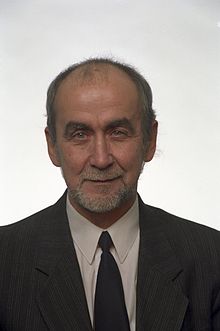Imants Kalniņš
Imants Kalniņš (born May 26, 1941 in Riga , Latvia ) is a Latvian composer who wrote both classical music and rock music . Kalniņš is also politically active; he is a member of the Saeima , the Latvian parliament , for the Tēvzemei un Brīvībai / LNNK party.
Life
After training in classical and choral music at the Latvian Music Academy Jāzeps Vītols with Ādolfs Skulte , he wrote six symphonies , six operas , including the first rock opera of the Soviet Union - Ei, jūs tur! (Hey, you there! ) And the 1977 opera Spēlēju, dancoju ('I played, I danced'), oratorios , cantatas , pieces for choir, as well as a number of musical works for film and theater . He was best known for his rock songs; he is considered to be the first composer of intellectual rock music in Latvia.
During the 1960s Kalniņš led the rock band 2xBBM in Liepāja, which was very popular because of their heartfelt songs and the hippie way of life. Kalniņš became a symbol of the mindset, worldview and rebellion of his age group and that ultimately resulted in the band being banned by the authorities. However, that was not the end of Kalniņš 'music - now it was performed by the equally popular band Menuets , who played almost nothing else. In 1967 he wrote the music for the Latvian musical cult film Elpojiet dziļi! (Take a deep breath!) .
In the 1970s Kalniņš wrote symphonic music again, but found his way back to rock in 1984 and worked with Juris Kulakovs and Juris Sējāns on the rock oratorio Kā jūra, kā zeme, kā debess (Like the sea, like the earth, like the sky) . The oratorio was the first public performance of the band Pērkons ('Thunder'), for which he wrote many new songs afterwards, before founding his own band called Turaidas Roze ('The Rose of Turaida'). But this never achieved the same popularity and admiration as Menuets and Pērkons.
During the singing revolution , when Latvia regained its independence, Kalniņš was actively involved in the political movement Tautas Fronte , which played an important role in overcoming the Soviet occupation. Closely connected with Kalniņš is the Imantdienas festival (“Imants days”), which was very popular in Soviet times and therefore banned. In 1995 this tradition was resumed, the days took place every year (with the exception of 1997, when the composer was traveling) and are at least as successful as before. In 2001 Kalniņš turned back to classical music and composed his sixth symphony for choir and orchestra based on texts by Rabindranath Tagore and psalms .
Imants Kalniņš's collaboration with Ainars Mielavs resulted in some excellent albums, mainly with pieces composed by Kalniņš such as Par lietām, kas tā ar 'nekad nepāriet (Things that never quite go away) , 1997, Es redzēju sapnī (I saw in a dream ) , 1998 and I Love You , 1999 (despite the title, the lyrics of this album are mostly Latvian ). In 2000, the Liepāja Symphony Orchestra re-recorded the music for the 1973 film Pūt, vējiņi (Blase, Wind, Blase) with well-known singers.
Imants Kalniņš was from 1993 to 1995 and has been a member of the Saeima since 1998 for the nationalist party Tēvzemei un Brīvībai / LNNK . He currently works on the Budget and Finance Committee and the Mandates, Ethics and Procurement Practice Committee.
Kalniņš translated the Koran and said that a mosque should be built in Latvia.
family
Kalniņš's daughter Rēzija Kalniņa is a well-known actress, his son Marts-Kristians Kalniņš is the singer of the band Autobuss Debesīs .
Web links
| personal data | |
|---|---|
| SURNAME | Kalniņš, Imants |
| BRIEF DESCRIPTION | Latvian composer and politician, member of the Saeima |
| DATE OF BIRTH | May 26, 1941 |
| PLACE OF BIRTH | Riga |
